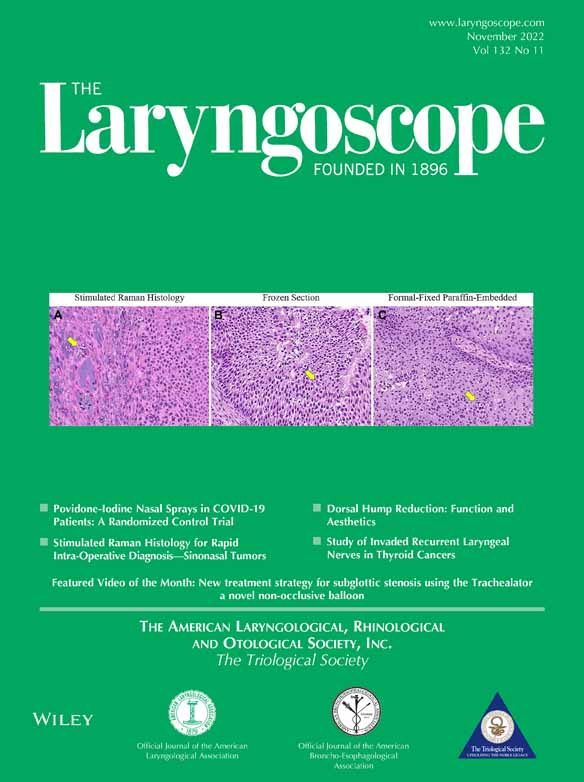Recurrent Laryngeal Nerve Invasion by Thyroid Cancer: Laryngeal Function and Survival Outcomes
Editor's Note: This Manuscript was accepted for publication on March 21, 2022.
J.A.B., A.H.A.A. and Z.A-Q. contributed equally as co-first authors.
The authors have no funding, financial relationships, or conflicts of interest to disclose except for the corresponding author.
Abstract
Background
Recurrent laryngeal nerve (RLN) invasion by thyroid carcinoma represents an advanced disease status with potentially significant co-morbidity.
Methods
In a retrospective single-center study, we included patients with invaded RLNs operated on while using nerve monitoring techniques. We studied pre-, intra-, and postoperative parameters associated with postoperative vocal cord paralysis (VCP); 5-year recurrence-free survival (RFS); and 5-year overall survival (OS) in addition to two subgroup analyses of postoperative VCP in patients without preoperative VCP and based on source of RLN invasion.
Results
Of 65 patients with 66 nerves-at-risk, 39.3% reported preoperative voice complaints. Preoperative VCP was documented in 43.5%. The RLN was invaded by primary tumor in 59.3% and nodal metastasis in 30.5%. Papillary thyroid carcinoma was the most common pathologic subtype (80%). After 6 months, 81.8% had VCP. Complete tumor resection of the RLN was not associated with 5-year RFS (p = 0.24) or 5-year OS (p = 0.9). Resecting the RLN did not offer statistically significant benefit on 5-year RFS (p = 0.5) or 5-year OS (p = 0.38). Radioactive Iodine (RAI) administration was associated with improvement in 5-year RFS (p = 0.006) and 5-year OS (p = 0.004). Patients without preoperative VCP had higher IONM amplitude compared with patients with VCP. After a mean follow-up of 65.8 months, 35.9% of patients had distant metastases, whereas 36.4% had recurrence.
Conclusion
Preoperative VCP accompanies less than half of patients with RLN invasion. Invaded RLNs may have existent electrophysiologic stimulability. Complete tumor resection and RLN resection were not associated with better 5-year RFS or OS, but postoperative RAI was.
Level of Evidence
4 Laryngoscope, 132:2285–2292, 2022
CONFLICT OF INTERESTS
Dr. Gregory W. Randolph has received a research grant (no personal fees) from Eisai. Dr. Gregory W. Randolph is the President of the International Thyroid Oncology Group (ITOG) and the World Congress on Thyroid Cancer (WCTC) and is Chair of the Administrative Division of the American Head and Neck Society (AHNS). All other authors listed in this manuscript reported no conflict of interest.




